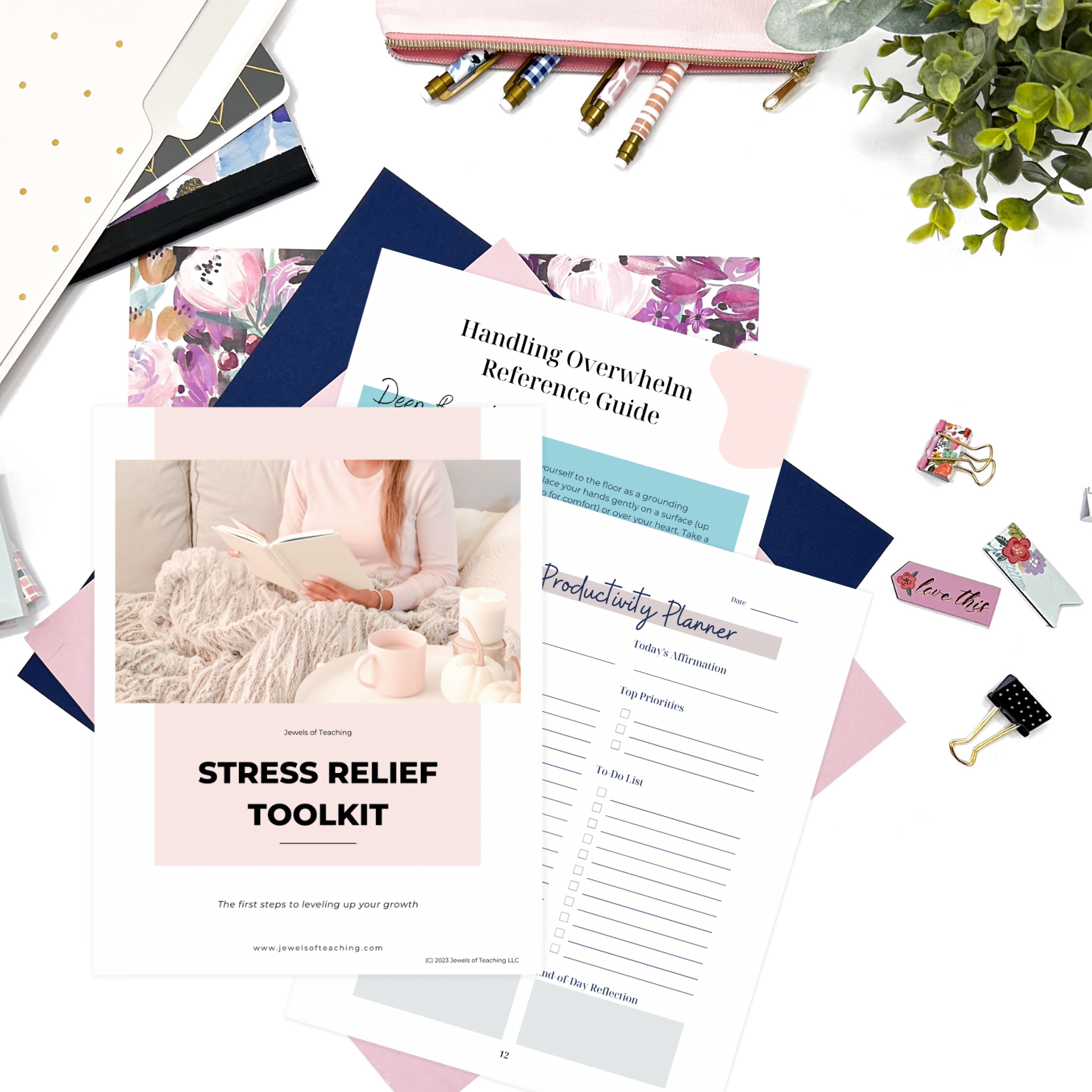How Stress Impacts Your Brain And Teacher Business

Introduction
Many teacherpreneurs are building their teacher business while dealing with the aftereffects of teacher stress. If this describes you, then you already know how the stress of teaching can carry over to your business. And you won't be surprised to learn that teachers report more than double the stress load of other American workers. When you add a teacher business on top of this, this stress load becomes even more acute.
If you're wondering how teacher stress can impact your brain and business, and whether you can protect yourself from it, you're in the right place. Chronic stress has adverse effects on your business and brain, and can even result in short and long-term impairment. This is why it's critical to address it as soon as possible.
In this article, I'll discuss the following:
- 5 significant effects of stress on the brain
- Your natural stress response cycle
- How stress impacts you as an entrepreneur teacher
- My free teacher stress relief kit and solutions you can start integrating today
Let's get to it.
Stress and the Brain
When we think about stress's effects on the brain, it's important to remember that healthy stress levels can strengthen the brain.
We're discussing chronic levels of unhealthy, often debilitating stress. Not only does this harmful stress make you feel miserable and ruin your quality of life, but it also damages your brain's health and function. And as you know, teacher CEO and teacher stress can be a chronic form of extreme stress.
Let's look at 5 major effects of stress on the brain.
1. Stress Can Cause Memory Issues
Researchers consistently find that any stress, even low-grade stress like being late, often leads to memory loss. Low-grade stressors could be worrying over a meeting, running late, or being fatigued. Any of these types of situations, as well as more serious stressors, can cause forgetfulness.
A Harvard researcher theorizes that your brain has two modes - survival mode (associated with the amygdala) and memory mode (associated with the hippocampus). Stress throws you into survival mode, which takes functioning away from memory mode. This is due to its negative impact on hippocampal function, which impairs memory consolidation, memory transfer, and spatial memory.
Chronic stress is also linked to long-term memory diseases like dementia and Alzheimer's.
2. Stress Can Kill New Brain Cells
Current research shows that stress can impact the survival of new neurons. The hippocampus is one of only two brain locations that produce new brain cells. And recent studies show that new neurons produced during times of stress are more likely to die within a week than neurons produced when your nervous system is neutral. This early death of neurons impacts brain function, stagnating your learning and business efforts.

3. Stress Can Shrink Your Brain
Chronic stress causes brain shrinkage over time. This affects many things, including your ability to cope with stressors. Stress shrinks parts of your brain associated with metabolism, emotions, higher-order thinking, and memory (there's the memory, again!). It can also make the brain more vulnerable to shrinking in the face of intense stressors, impacting your ability to deal with future stress. Over time, the shrinkage causes your brain's structure to change, decreasing your ability to problem-solve and make good decisions. Since success and the sustainability of your business rely on problem-solving and good decisions, not taking care fo stress can debilitate you in these areas.
4. Chronic Stress Can Cause Avoidance, Decrease Social Functioning, and Impact Mental Health
Chronic stress can cause you to want to avoid other people. This is different from social anxiety. This avoidance response starts in the brain, and researchers believe that it's linked to lower synapse regulation. It could also be a flight response that affects your social functioning. The resulting isolation can impact your mental health and support system and raise issues like depression or anxiety.
5. Chronic Stress Disrupts Your Stress Response Cycle
Your natural stress response is your nervous system's way to keep you safe in the face of a real or imagined threat. It's not just your fight/flight/freeze/fawn response. You can learn more about these four responses here.
When healthy, this response turns "on" in the face of a real threat. When on, it creates conditions of safety and processes the stress. It then turns "off," which allows your nervous system to return to homeostasis. This process is called your "stress response cycle."
The pathway of events in a healthy stress response cycle might be summarized as:
Trigger → Take in information to determine response → Physiological stress response (flight/flight/freeze/fawn) → Become actively aware of the stress occurring → Stress processing and coping → Return to stability/neutral
However, when you experience chronic stress, your stress response is constantly "on." The amygdala (your brain's fear center) stays activated. Stress hormones like adrenaline and cortisol also remain elevated. Your body is constantly prepared to initiate fight or flight, which means that breathing rate, glucose levels, heart rate, and blood flow all increase. Energy is taken from less critical processes like digestion. Because of these system-wide state changes, your nervous system can never fully process the stress, turn "off," and end the stress cycle and burnout.
How Your Nervous System Processes Stress (H4)
To your nervous system, releasing or processing stress has less to do with thoughts or emotions, and more to do with your body. Stress in your nervous system happens at the physiological level. This is why your body can best complete the stress cycle when you manage it on the physiological level.
This means anything physical such as walking, shaking, dancing, or doing something active in nature, will help you complete the stress response cycle and return to normal.

3 Ways To Protect The Brain From Stress
Harvard researchers and I agree on one thing when it comes to stress and the brain. You can protect your brain from chronic stress by incorporating effective stress reduction and relief methods. I focus on this in-depth in my Teacher Life Balance Membership and free teacher stress relief kit for entrepreneur teachers.

To protect your brain from stress:
- Establish control over the things you have control over. This includes diet, routines, habits, schedules, and sleep hygiene.
- Get organized by streamlining processes that manage your workload and free up time. These processes include time management, boundaries, outsourcing or delegating, and planning.
- Learn more about stress and focus on healthy stress responses instead of eliminating stress (which is unrealistic).
Conclusion
I hope this article helps you understand how the stress of teaching and entrepreneurship can impact your brain and teacher business. While some stress is normal and healthy, chronic stress or exposure to too many intense stressors isn't helpful. We can exert control over the things we have control over and cultivate healthy stress responses. The first step is learning how stress impacts your brain, life, and business.
Download The Free Stress Relief Toolkit for Entrepreneur Teachers

Now that you've learned about the effects of stress on the brain, why not take the next step and learn easy ways to reduce and relieve stress?
My free teacherpreneur stress relief kit helps you deal with both teacher stress plus entrepreneur stress. The kit’s easy cheat sheets, infographics, and worksheets will help you get started today.
Do you want support as you go in-depth with stress and other things that impact your teacher business? Check out my monthly Teacher Business Balance Membership. This monthly membership guides you to design a life and business that works for you.
Stay connected with the monthly newsletter!
Join our monthly newsletter to access our top 5 tips of the month to increase your work-life balance directly in your inbox on the first Tuesday of every month. PLUS, you'll also receive the Stress Relief Toolkit right away.
We hate SPAM. Unsubscribe at any time.

